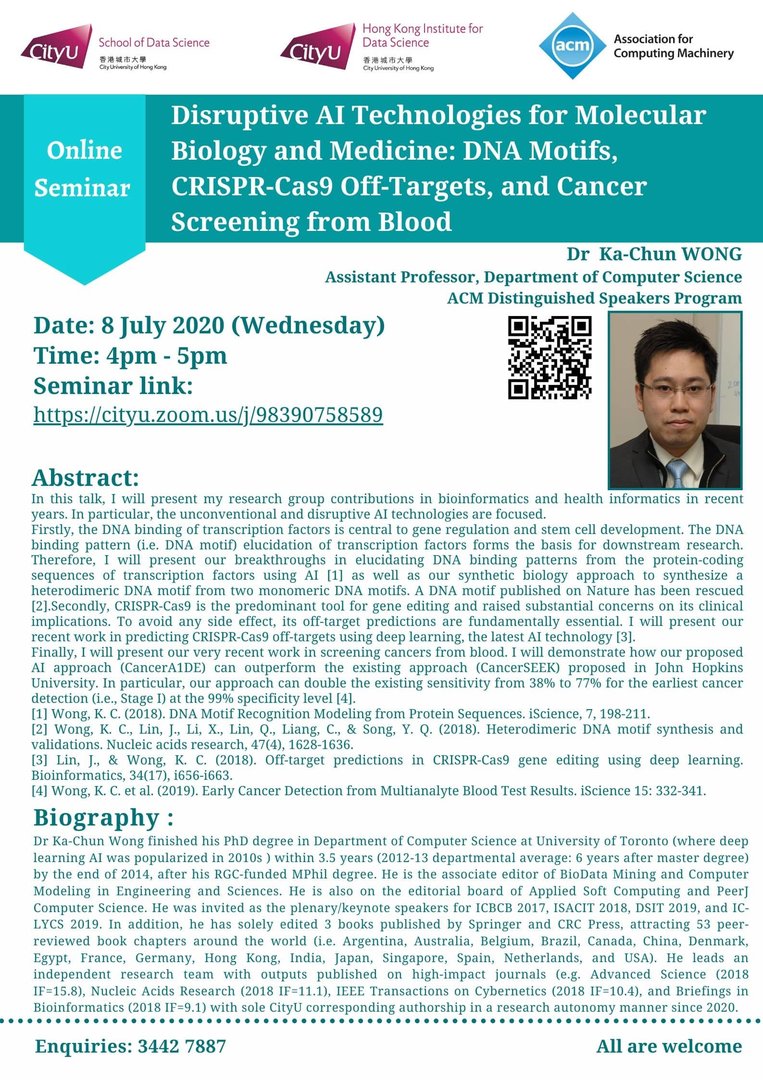
In this talk, I will present my research group contributions in bioinformatics and health informatics in recent years. In particular, the unconventional and disruptive AI technologies are focused.
Firstly, the DNA binding of transcription factors is central to gene regulation and stem cell development. The DNA binding pattern (i.e. DNA motif) elucidation of transcription factors forms the basis for downstream research. Therefore, I will present our breakthroughs in elucidating DNA binding patterns from the protein-coding sequences of transcription factors using AI [1] as well as our synthetic biology approach to synthesize a heterodimeric DNA motif from two monomeric DNA motifs. A DNA motif published on Nature has been rescued [2].Secondly, CRISPR-Cas9 is the predominant tool for gene editing and raised substantial concerns on its clinical implications. To avoid any side effect, its off-target predictions are fundamentally essential. I will present our recent work in predicting CRISPR-Cas9 off-targets using deep learning, the latest AI technology [3].
Finally, I will present our very recent work in screening cancers from blood. I will demonstrate how our proposed AI approach (CancerAlDE) can outperform the existing approach (CancerSEEK) proposed in John Hopkins University. In particular, our approach can double the existing sensitivity from 38% to 77% for the earliest cancer detection (i.e., Stage I) at the 99% specificity level [4].
[1] Wong, K. C. (2018). DNA Motif Recognition Modeling from Protein Sequences. iScience, 7, 198-211.
[2] Wong, K. C., Lin, J., Li, X., Lin, Q., Liang, C., & Song, Y. Q. (2018). Heterodimeric DNA motif synthesis and validations. Nucleic acids research, 47(4), 1628-1636.
[3] Lin, J., & Wong, K. C. (2018). Off-target predictions in CRISPR-Cas9 gene editing using deep learning. Bioinformatics, 34(17), i656-i663.
[4] Wong, K. C. et al. (2019). Early Cancer Detection from Multianalyte Blood Test Results. iScience 15: 332-341.
Speaker: Dr Ka-Chun WONG
Date: 8 July 2020 (Wed)
Time: 16:00pm - 17:00pm
Poster: Click here
Latest Seminar
Biography
Dr Ka-Chun Wong finished his PhD degree in Department of Computer Science at University of Toronto (where deep learning AI was popularized in 2010s ) within 3.5 years (2012-13 departmental average: 6 years after master degree) by the end of 2014, after his RGC-funded MPhil degree. He is the associate editor of BioData Mining and Computer Modeling in Engineering and Sciences. He is also on the editorial board of Applied Soft Computing and Peer] Computer Science. He was invited as the plenary/keynote speakers for ICBCB 2017, ISACIT 2018, DSIT 2019, and IC LYCS 2019. In addition, he has solely edited 3 books published by Springer and CRC Press, attracting 53 peer reviewed book chapters around the world (i.e. Argentina, Australia, Belgium, Brazil, Canada, China, Denmark, Egypt, France, Germany, Hong Kong, India, Japan, Singapore, Spain, Netherlands, and USA). He leads an independent research team with outputs published on high-impact journa ls (e.g. Advanced Science (2018 IF=lS.8), Nucleic Acids Research (2018 IF=ll.l), IEEE Transactions on Cybernetics (2018 IF=l0.4), and Briefings in Bioinformatics (2018 IF=9.1) with sole CityU corresponding authorship in a research autonomy manner since 2020.